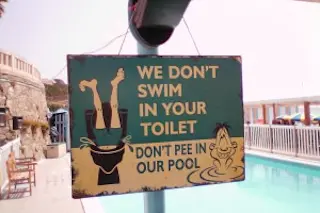Photo: flickr/tano_d'erePeeing in the pool, although considered a gross social faux-pas, seems harmless enough, right? And so much easier that getting out of the pool, drying off, and trekking to the nearest toilet. But what happens when the uric acid in your pee reacts with the chlorine and other chemicals in pool water? In this study, researchers from China Agricultural University and Purdue University studied the chemical byproducts that form when pee meets pool. They found that two chemicals, cyanogen chloride and thrichloramine, are formed by the reaction of uric acid and chlorine. When inhaled, these chemicals are known to affect multiple organs, including the lungs, heart, and central nervous system. So it seems that peeing in the pool has its own punishment -- it's just too bad it affects everyone.Volatile disinfection byproducts resulting from chlorination of uric acid: Implications for swimming pools "Cyanogen chloride (CNCl) and trichloramine (NCl3) are important disinfection byproducts in chlorinated swimming pools. However, some unknowns exist regarding the precursors of their formation. In this study, uric acid is shown to be an efficient precursor to formation of CNCl and NCl3. The molar yields of CNCl and NCl3 were observed to be as high as 44% (pH = 6.0, chlorine/precursor molar ratio [Cl/P] = 6.4) and 108% (pH = 7.0, Cl/P = 30), respectively, both being strong functions of Cl/P, pH, and temperature. Analysis of swimming pool water samples, combined with the results of experiments involving chlorination of uric acid, and chlorination of body fluid analog mixtures, indicated that uric acid chlorination may account for a large fraction of CNCl formation in swimming pools. Moreover, given that uric acid introduction to pools is attributable to urination, a voluntary action for most swimmers, these findings indicate important benefits to pool water and air chemistry that could result from improved hygiene habits on the part of swimmers." Related content: NCBI ROFL: What's happening in your brain while you pee?NCBI ROFL: Asparagus, urine, farts, and Benjamin Franklin (Part I)NCBI ROFL: The identification of attractive volatiles in aged male mouse urine.
The poisonous pee byproducts lurking in swimming pools.
Discover how uric acid chlorination leads to harmful disinfection byproducts in swimming pools, affecting swimmers' health.
More on Discover
Stay Curious
SubscribeTo The Magazine
Save up to 40% off the cover price when you subscribe to Discover magazine.
Subscribe













